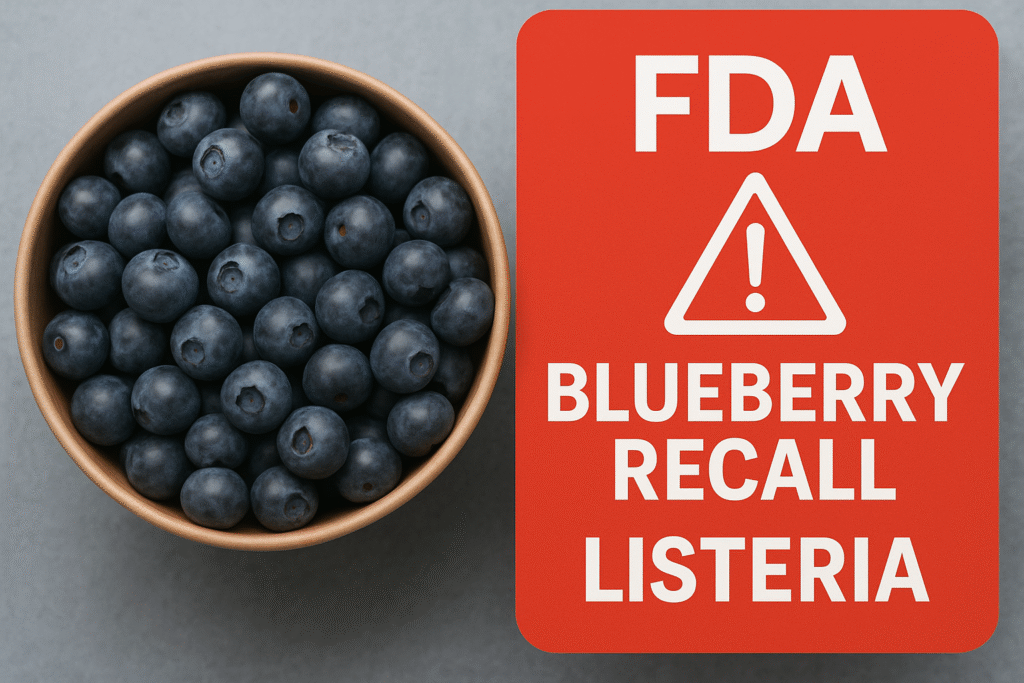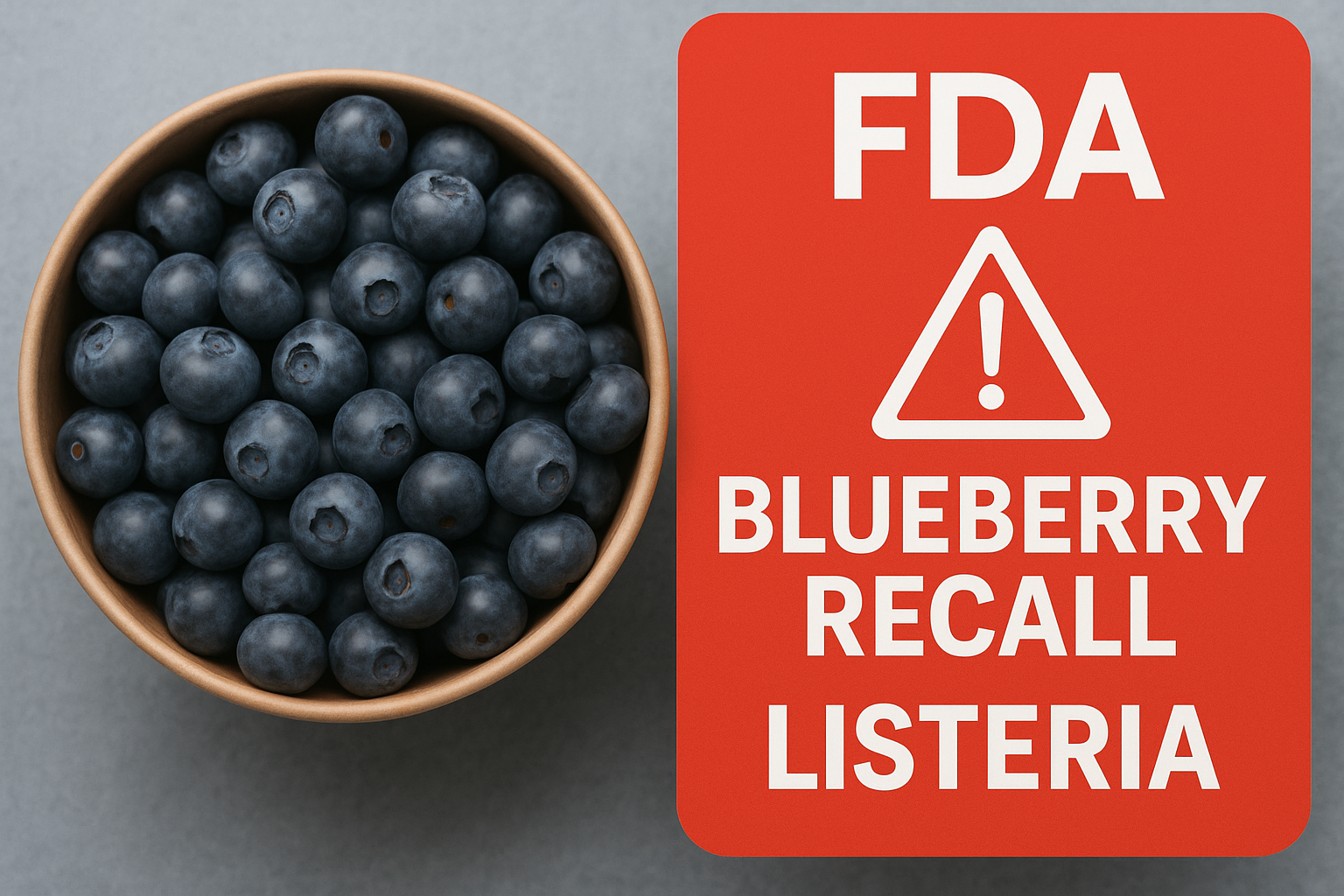Introduction
On July 1, 2025, the U.S. Food and Drug Administration (FDA) escalated a recall of 400 boxes of organic blueberries from Alma Pak International LLC to a Class I status, the agency’s highest risk level, due to contamination with Listeria monocytogenes.
The voluntary recall, initially announced by the Georgia-based company on June 9, 2025, affects 12,000 pounds of organic blueberries distributed to a single customer in North Carolina. This article provides a comprehensive overview of the recall, the risks associated with listeriosis, and actionable steps for consumers, aiming to rank highly on Google by addressing key aspects of the issue.

Details of the Recall
The recall involves 400 boxes of organic blueberries, each weighing 30 pounds, totaling 12,000 pounds of potentially contaminated product. The affected blueberries are identifiable by lot numbers 13325 G1060 and 13325 G1096. Alma Pak International LLC initiated the recall after routine testing detected Listeria monocytogenes, a dangerous bacterium that can cause severe illness or death.
The FDA’s Class I designation, issued on July 1, 2025, indicates a “reasonable probability” that consuming the affected blueberries could lead to serious health consequences or death. The recalled blueberries were shipped to a single commercial customer in North Carolina, but it remains unclear whether they were further distributed to retailers, foodservice providers, or smaller markets.
Health Risks of Listeria Monocytogenes
Listeria monocytogenes is a foodborne pathogen responsible for listeriosis, the third leading cause of death from foodborne illness in the United States, claiming approximately 260 lives annually. Symptoms of listeriosis vary depending on the severity of the infection. Mild cases may present with flu-like symptoms such as fever, muscle aches, nausea, vomiting, and diarrhea, typically lasting one to three days.
However, in vulnerable populations—pregnant women, newborns, adults over 65, and individuals with weakened immune systems—the infection can escalate to severe conditions like meningitis or sepsis.
Symptoms of severe listeriosis include headaches, stiff neck, confusion, loss of balance, and convulsions. Pregnant women face additional risks, including miscarriage, stillbirth, or life-threatening infections in newborns. The FDA advises anyone experiencing these symptoms after consuming blueberries to seek immediate medical attention.
Context of the Recall
The Alma Pak recall is part of a broader surge in food recalls in 2024 and 2025, with listeria contamination being the second leading cause of recall events in 2024, accounting for nearly 15% of cases. In 2024 alone, approximately 300 food recalls were linked to nearly 1,400 illnesses, 487 hospitalizations, and 19 deaths, a significant increase from 2023.
Other recent listeria-related recalls include 44,550 pounds of shrimp from Bornstein Seafoods Inc. in June 2025 and ready-to-eat chicken fettuccine Alfredo products from FreshRealm, linked to three deaths and one fetal loss across 13 states. These incidents highlight growing concerns about foodborne pathogens in the U.S. food supply, particularly in refrigerated and frozen products, as Listeria monocytogenes can survive and spread in cold environments.
Consumer Safety Recommendations
Consumers who have purchased organic blueberries, especially in bulk or unlabeled containers, should check for the affected lot numbers (13325 G1060 and 13325 G1096). The FDA recommends discarding any matching products or returning them to the place of purchase.
Since listeria can persist in refrigerated environments, thorough cleaning of refrigerators, containers, and surfaces that may have come into contact with the blueberries is essential to prevent cross-contamination. The FDA suggests the following steps:
- Refrigerator Cleaning: Wipe down surfaces with hot, soapy water and disinfect with a bleach-based solution (1 tablespoon of unscented liquid chlorine bleach per gallon of water).
- Hand Washing: Scrub hands thoroughly before and after handling fresh produce.
- Cross-Contamination Prevention: Avoid mixing produce in the same container unless it has been fully cleaned.
- Product Rinsing: Rinse all fruits, even those labeled pre-washed, under running water.
Consumers in North Carolina, particularly those who purchased blueberries from small grocers, farmers’ markets, or co-ops, should contact their supplier to confirm whether the product originated from Alma Pak. If unsure, it is safer to discard the blueberries to avoid potential health risks.
Alma Pak’s History and Broader Implications
This is not the first recall for Alma Pak International LLC. In June 2019, the company recalled frozen blackberries sold under the Great Value and Tipton Grove brands due to norovirus contamination, highlighting a history of contamination issues.
The current recall underscores the challenges of ensuring food safety in large-scale produce distribution, particularly for organic products that may not undergo the same processing as conventional ones.
Blueberries are generally considered low-risk for listeria due to their low pH, making this outbreak notable. The FDA’s ongoing investigation and lack of consumer-facing press releases suggest that further distribution details may emerge, potentially affecting foodservice or repackaged products.
Public Health and Regulatory Response
The FDA, in collaboration with the Centers for Disease Control and Prevention (CDC), continues to monitor listeria outbreaks and enforce recalls to protect public health. The agency’s Class I designation emphasizes the urgency of removing contaminated products from circulation.
Alma Pak has fully recovered the affected blueberries before they reached retail markets, but consumers should remain vigilant. The CDC and FDA advise high-risk groups experiencing flu-like symptoms within two months of consuming potentially contaminated food to seek prompt medical attention and report possible exposure.
Conclusion
The FDA’s Class I recall of Alma Pak’s organic blueberries is a critical public health alert, emphasizing the severe risks posed by Listeria monocytogenes. Consumers, particularly in North Carolina, should check lot numbers, dispose of affected products, and follow rigorous cleaning protocols to prevent listeriosis. This recall reflects broader challenges in food safety, with rising incidents of contamination in 2024 and 2025.
By staying informed and taking proactive measures, consumers can mitigate risks and contribute to safer food practices. For the latest updates, visit the FDA’s recall page at www.fda.gov or contact Alma Pak at the provided recall hotline.
